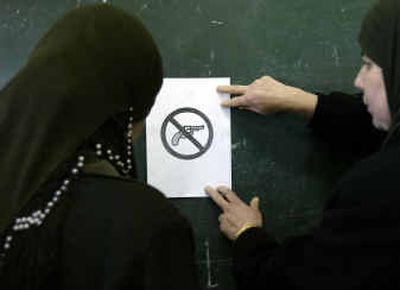Palestinians head to polls

HEBRON, West Bank – This weekend’s election to replace Yasser Arafat has the potential to usher in the Arab world’s first genuine democracy with a peaceful transfer of power that will augur well for the dream of a Palestinian state. The new Palestinian president – widely expected to be Mahmoud Abbas – doesn’t have an easy job ahead of him.
But four years of bloody conflict with Israel have deflated expectations ahead of today’s vote. Many Palestinians say they will settle for simpler achievements: jobs, clean government, and an end to ubiquitous Israeli roadblocks.
“We don’t need theater,” said 68-year-old Saud Jaradat, a village elder in Sair, near Hebron. “It’s time to start solving our problems,” he said in a clear reference to Arafat’s four decades of roller-coaster leadership.
Underscoring the challenges, Palestinians and international observers said Saturday that Israel was slow to fulfill its promise to ease travel restrictions in the West Bank and Gaza Strip to ensure a smooth vote.
Voters began trickling into stations shortly after the polls opened this morning, and activity appeared brisk in many areas within half an hour. No problems were reported.
“I came because I want change. Any change,” said Fathi Kamal, a 53-year-old taxi driver, who cast his vote early today before heading to work. He declined to say who he was voting for.
Israel, meanwhile, signaled that it was ready to work with Abbas, whose victory was more or less a foregone conclusion.
Senior Israeli officials said they would seek a meeting with Abbas shortly after the election. Speaking on condition of anonymity, they said that Israel would offer to release Palestinian prisoners in exchange for a crackdown on Palestinian rocket attacks in the Gaza Strip.
Abbas, 69, has begun to chip away at his gray image – alarming some Israelis with a public embrace of militants but gaining new stature among Palestinians whose backing he’ll need for any future peace deal.
Polls show him with more than double the support of his nearest rival, democracy activist Mustafa Barghouti, suggesting the question is not if Abbas will win, but by how much. The answer will have great impact on Abbas’ ability to rein in militants and talk peace with Israel.
Mahdi Abdul Hadi, chairman of the Palestinian Academic Society, said the candidate will need 65 percent of the vote to get the mandate he needs.
“Otherwise the Israelis will not respect your position, and they will keep you weak and (the militant group) Hamas wants you to be weak in order to bargain,” he said.
Arafat’s authoritarian rule and corruption-ridden administration were seen as major obstacles to progress and Mideast peacemaking. Palestinians hope the new government will be more transparent and mindful of the rule of law.
“Whoever wins … will be subject to scrutiny and accountability, which Arafat got away with because he could get away with anything because of his standing,” said Palestinian legislator Hanan Ashrawi.
Abbas has made it clear that his fundamental goal is the same as Arafat’s: an end to Israeli occupation and a Palestinian state in the West Bank and Gaza Strip.
Abbas says he wants to co-opt militants such as Hamas and Islamic Jihad instead of crushing them as Israel demands.
But he insists the armed uprising against Israel should end. Persuading militants to declare a truce while he attempts to reopen negotiations with Israel will likely be his biggest challenge.
Abbas became interim Palestinian leader after Arafat died on Nov. 11 of still undetermined causes. He spent most of his career in Arafat’s shadow, but was instrumental in shaping Palestinian policy and became one of the first to favor dialogue with Israel.
Some 1.8 million Palestinians are eligible to vote. More than 2,800 ballot boxes were shipped Saturday to 1,077 polling stations in the West Bank and Gaza.
Only a small fraction of the estimated 120,000 eligible Palestinian voters in Jerusalem will be permitted to cast ballots in the city, however, with the vast majority being forced to travel to special polling centers in suburbs.
Jerusalem is at the heart of the Israeli-Palestinian conflict, and both peoples claim it as their capital. Many Palestinians in the holy city said they would refrain from voting out of fear of jeopardizing their fragile status under Israeli rule.
Palestinian activists held a series of conferences in the city last week to persuade people to vote.